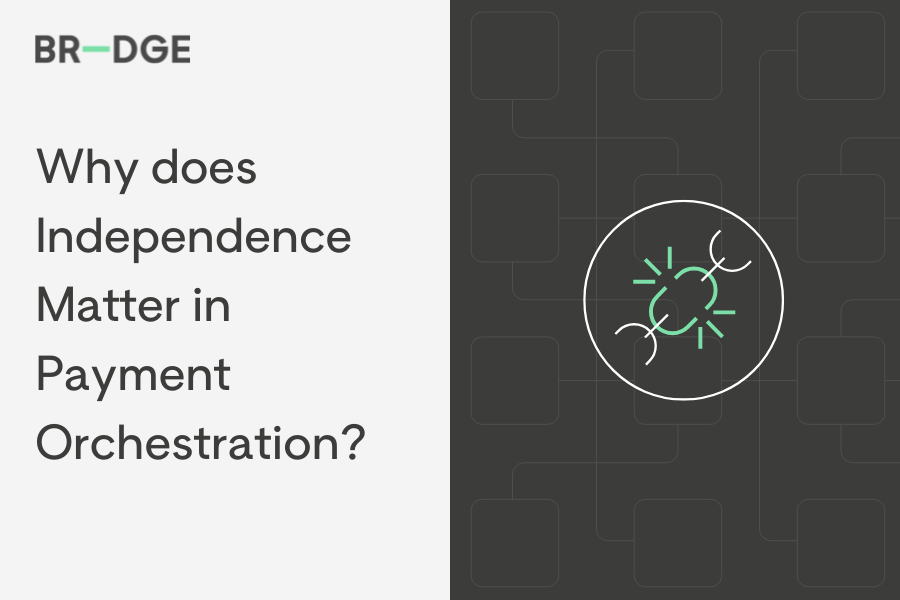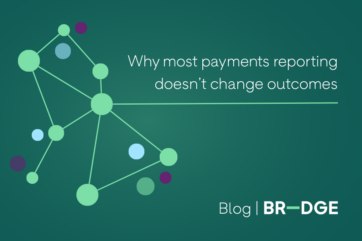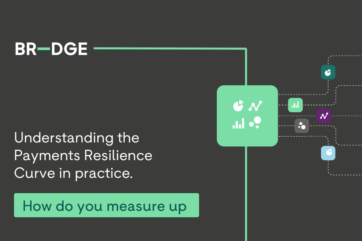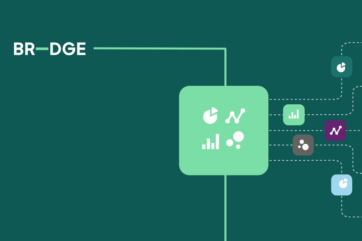
Why Independence Matters in Payment Orchestration

Merchants are drowning in complexity. A single transaction today can involve multiple providers, intricate routing rules and a cluttered network of technological integrations.
Behind every transaction, there’s a battle for control. Both merchants and acquirers face restrictions from legacy payment systems, closed-loop networks and limited integrations. Whether it’s being locked into a predefined set of connections or constrained by rigid infrastructure, these limitations create inefficiencies and slow growth.
Payment orchestration offers a lifeline for both merchants and payment providers - but not all orchestration is created equal. The key? Independence.
Why independence matters
What do we means by ‘independence’ in the context of orchestration? In our view, effective orchestration solutions need to include independence on several fronts; it needs to be:
- 1. An independent software layer that sits above and separately from both inhouse and third-party tech stacks
- 2. Operated by an independent specialist provider who is vendor agnostic and focused on delivering the right configurations for each customer
3. Supported by experts who objectively understand the market and can see across it, who can facilitate data, spot trends and support tailored strategies based on informed analysis and specialist technology and experience
What this provides is freedom, flexibility and control payment providers, merchants, their customers and everyone else in the payments chain.
True independence in payment orchestration essentially removes the restrictive barriers that businesses typically face around payments, giving them the ability to build payment strategies that work for their specific needs, and support their growth. It ensures they aren’t tied to a single provider’s ecosystem, allowing them to adapt, scale and stay competitive.
For merchants, this means the ability to switch or add providers, integrate new payment methods, and optimise transactions without friction. For acquirers, it means offering merchants true choice, enhancing service value and strengthening long-term relationships. Instead of being limited to a fixed set of providers or payment rails, businesses can design payment strategies that align with their operational goals and customer preferences.
Future-proofing payments
The payments sector never stands still. New providers enter the market, fraud tactics shift, and customer expectations evolve. An independent orchestration layer helps businesses stay ahead without being constrained by rigid or outdated systems.
With true independence, merchants and acquirers gain the flexibility to shape their payment strategies without limitations. They can integrate fraud tools, gateways and payment methods that align with their needs – and change those solutions if their business needs evolve.
Routing logic can be adjusted dynamically based on cost, authorisation rates, or success rates, ensuring the best outcomes for every transaction. Expanding into new markets also becomes easier, as businesses are not restricted by a single provider’s footprint, or pushed to use ‘favoured suppliers’ that potentially don’t suit their needs. Independence allows payments to be configured for efficiency, resilience and scalability, adapting to both immediate challenges and future growth opportunities.
A truly independent payment orchestration layer ensures businesses are not tied to one vendor’s roadmap or priorities. Instead, they have the freedom to test, iterate and optimise payment strategies without barriers. This not only leads to improved performance but also helps businesses control costs by selecting the most effective routes and services for each transaction. As the industry continues to shift, companies that have independence built into their payment infrastructure will be able to pivot faster and stay ahead of emerging trends.
The benefits of independent orchestration
For both acquirers and merchants, an independent approach unlocks greater efficiency, choice and reliability. It lets businesses shape their payment strategy to fit their needs, rather than adjusting to a limited set of options.
- Greater choice and control
Payments should work for merchants, not the other way around. It’s like a chef being forced to use a set menu of ingredients, fine for some, but limiting for those with specific tastes. Too often, providers restrict access to certain gateways and fraud tools, leaving merchants stuck with options that don’t fit their business. Independent orchestration puts the power back in their hands.
- Continuous operations
A failed payment is more than an inconvenience, it’s lost revenue, a frustrated customer and a potential sale gone forever. Whether it’s a system outage or a provider going offline, these disruptions can have serious consequences. Independent orchestration acts like a finely tuned backup generator for payments, keeping transactions moving even when things go wrong. If one provider goes down, payments are automatically rerouted through alternative channels, minimising disruption and keeping business flowing smoothly.
- Seamless integration of new payment methods
Consumer preferences change fast. One day it’s all about credit cards, the next, digital wallets and BNPL are the norm. Businesses can’t afford to be stuck playing constant catch-up. Independent orchestration removes these delays, making it easy to add new payment methods without complex system overhauls. Instead of being at the mercy of a provider’s roadmap, merchants and acquirers can proactively integrate the latest innovations, giving customers the payment experiences they expect.
- Easier global expansion
Crossing borders goes beyond language and currency, it’s about payments, too. Every market has its own preferred payment methods, regulations, and consumer expectations. A one-size-fits-all approach rarely works. Independent orchestration allows merchants to tailor their payment strategies for each region, integrating local payment methods and compliance tools with ease. This flexibility makes international expansion smoother, helping businesses enter new markets without unnecessary friction.
- Strengthening merchant-acquirer relationships
Acquirers that offer real flexibility become trusted partners. Independent orchestration gives acquirers the ability to fine-tune their payment setups, helping their merchants improve authorisation rates, reduce costs, and offer better customer experiences. It’s the difference between being a supplier and being a strategic ally. In a competitive payments arena, giving merchants this level of control strengthens loyalty and helps acquirers stand out from the crowd.
A smarter approach to payments
The payments industry is shifting, and businesses that embrace independent orchestration will be better positioned to adapt.
BR-DGE’s independent orchestration platform empowers both acquirers and merchants, enabling seamless scalability, cost optimisation, and access to a truly open payments ecosystem. With the ability to respond to market changes and customer needs, independent orchestration is essential.
The future of payments is about choice, adaptability, and innovation. Are you ready to take control? Download our white paper to learn more.
Related content






